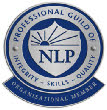

What is NLP
- How would you like to:
- improve your relationships?
- take control of your emotions?
- change your habits?
- experience more enthusiasm, confidence or inner peace?
- be more successful at work?
- be able to learn from those who already display the skills and strategies of excellence
and well-
being that you would like? - enhance your life in almost any area?
Neuro-
"NLP is the study of excellence
and how to reproduce it”
John Grinder, co-
In a world of change, more and more people are realising that their success, satisfaction
and fulfilment in life, personally and professionally, can be influenced by themselves
and that the skills to achieve this can be learnt. And, when it comes to the field
of personal and interpersonal skills development, NLP is at the cutting edge. NLP
offers powerful yet simple and practical step-
By training in NLP the competency, self-
“NLP is an attitude and methodology
that leaves behind a trail of techniques”
Richard Bandler, co-
The attitude from which NLP grew, and continues to grow, is one of curiosity, experimentation and openness to learning and perceiving the world in new ways.
The methodology of NLP is modelling -
The part of NLP for which it is usually best known is the trail of techniques which the modelling process created. Some of the better known applications include the ‘10 minute phobia cure’, methods for rapidly overcoming habits, questioning skills, influencing skills, ‘instant rapport’, walking on fire, the ‘good spelling strategy’ and an ‘effective meetings format’.
More important than the techniques though, are the underlying traits inherent in
NLP -
- recognition that everyone is unique and different;
- awareness of what is going on, in ourselves and others;
- the ability to learn from what is happening and to respond with choice and wisdom;
- the belief that we all have unused potential;
- the belief that by building on the resources we and others have, and by focusing on the desired results, we can achieve more of what we want and become more of who we want to be.
NLP offers an abundance of practical ways for changing and empowering one-
The name NLP describes the interconnectedness of our neurological processes (Neuro) to language (Linguistic) and that these processes have a particular organisation (Programming) that affects our behaviour.
"The most powerful tools, that I know of,
for defining human needs and being able
to fill those needs quickly and elegantly
come from the technology known as NLP."
Anthony Robbins
A Brief History of NLP
NLP developed from the innovative work of Richard Bandler and John Grinder in the early 1970s. They were fascinated with how some therapists could consistently achieve outstanding results in an almost magical way. The best known people whose skills they modelled, were Fritz Perls (Gestalt Therapy), Virginia Satir (Family Therapy) and Milton Erickson (Hypnotherapy). They were also influenced by the systems thinker Gregory Bateson. They and their students/fellow researchers then utilised the fundamental communication skills they had learned from these studies to model examples of excellence in many other fields, especially business, education, health care, sport and personal development. Since the early days Bandler, Grinder and their students and followers have developed their own styles and specialisations. Frank Daniels has studied with many of the developers including Bandler and Grinder, Robert Dilts, Connirae Andreas, Wyatt Woodsmall and Anthony Robbins. Frank Daniels Associates is one of the longest established NLP training organisations in Britain.
Who Benefits From Learning NLP
A wide variety of people including: business people (from executives to receptionists), health care professionals, educators, social workers, trainers, counsellors, students, hypnotherapists, psychotherapists, lawyers, doctors, musicians, sales people, and parents. In fact anyone who wants to work with others more effectively and anyone who wants to more effectively work on themselves.
If you are interested in enhancing your life, personally or professionally, you can benefit from learning NLP.
Organisational Clients
The following are examples of organisations who have either sponsored individuals
on our open courses or who have had In-
Amtico, British Gas, BT, DfEE, Egg, Inland Revenue, Leicestershire County Council, Nottingham Treasury, Pfizer Pharmaceuticals, Police Chief Staff Training College, The Post Office, Rank Xerox, Sheffield Hallam University, W.H.Smith, Toyota, Birmingham City Council, Nottimgham NHS Trust.
"NLP could be the most important synthesis of knowledge about human communication to emerge since the sixties."
Science Digest
Reading
Good introductory books are:
Introducing Neuro-
Unlimited Power, by A. Robbins. How to have 'unlimited power' in your life using NLP. Inspirational and American.
NLP The New Technology of Achievement, by Steve Andreas. Clearly written with emphasis on personal development. A step by step guide to achieving peak performance in life.
NLP at Work, by Sue Knight, Clear, readable and comprehensive work. NLP applied to business.
Influencing with Integrity, by Genie Labourde. Long-
Note for Newcomers
If you are new to NLP then reading about it, here, or in one of the many books available can give you some idea of what it is about. However, as the person who had only read or heard about delicious food discovered when eating it for the first time, there is a big difference between a description and the actual experience. The most direct way to experience NLP is to attend some training.
For an overview of the various courses we offer please click here.






